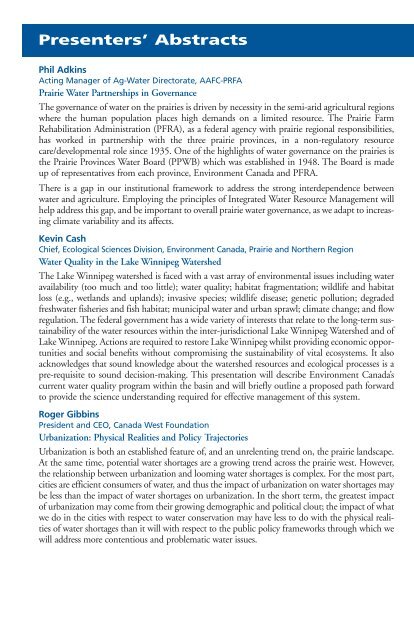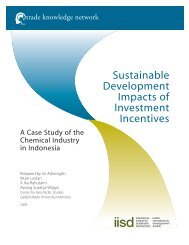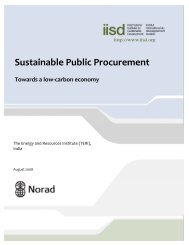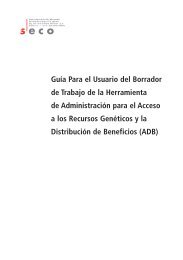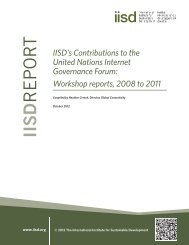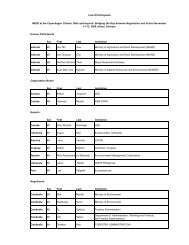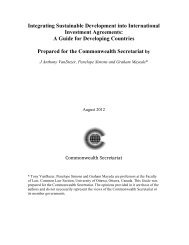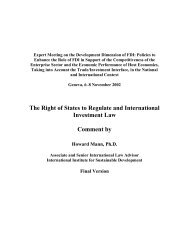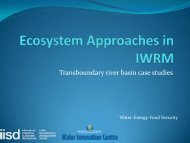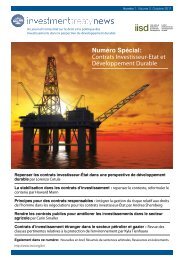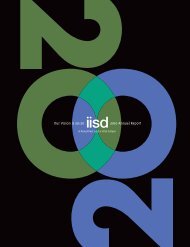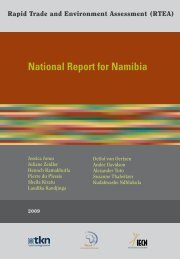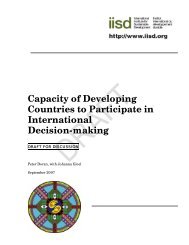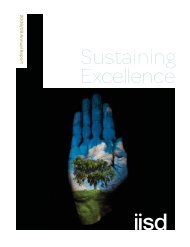Full program - International Institute for Sustainable Development
Full program - International Institute for Sustainable Development
Full program - International Institute for Sustainable Development
Create successful ePaper yourself
Turn your PDF publications into a flip-book with our unique Google optimized e-Paper software.
Presenters’ Abstracts<br />
Phil Adkins<br />
Acting Manager of Ag-Water Directorate, AAFC-PRFA<br />
Prairie Water Partnerships in Governance<br />
The governance of water on the prairies is driven by necessity in the semi-arid agricultural regions<br />
where the human population places high demands on a limited resource. The Prairie Farm<br />
Rehabilitation Administration (PFRA), as a federal agency with prairie regional responsibilities,<br />
has worked in partnership with the three prairie provinces, in a non-regulatory resource<br />
care/developmental role since 1935. One of the highlights of water governance on the prairies is<br />
the Prairie Provinces Water Board (PPWB) which was established in 1948. The Board is made<br />
up of representatives from each province, Environment Canada and PFRA.<br />
There is a gap in our institutional framework to address the strong interdependence between<br />
water and agriculture. Employing the principles of Integrated Water Resource Management will<br />
help address this gap, and be important to overall prairie water governance, as we adapt to increasing<br />
climate variability and its affects.<br />
Kevin Cash<br />
Chief, Ecological Sciences Division, Environment Canada, Prairie and Northern Region<br />
Water Quality in the Lake Winnipeg Watershed<br />
The Lake Winnipeg watershed is faced with a vast array of environmental issues including water<br />
availability (too much and too little); water quality; habitat fragmentation; wildlife and habitat<br />
loss (e.g., wetlands and uplands); invasive species; wildlife disease; genetic pollution; degraded<br />
freshwater fisheries and fish habitat; municipal water and urban sprawl; climate change; and flow<br />
regulation. The federal government has a wide variety of interests that relate to the long-term sustainability<br />
of the water resources within the inter-jurisdictional Lake Winnipeg Watershed and of<br />
Lake Winnipeg. Actions are required to restore Lake Winnipeg whilst providing economic opportunities<br />
and social benefits without compromising the sustainability of vital ecosystems. It also<br />
acknowledges that sound knowledge about the watershed resources and ecological processes is a<br />
pre-requisite to sound decision-making. This presentation will describe Environment Canada’s<br />
current water quality <strong>program</strong> within the basin and will briefly outline a proposed path <strong>for</strong>ward<br />
to provide the science understanding required <strong>for</strong> effective management of this system.<br />
Roger Gibbins<br />
President and CEO, Canada West Foundation<br />
Urbanization: Physical Realities and Policy Trajectories<br />
Urbanization is both an established feature of, and an unrelenting trend on, the prairie landscape.<br />
At the same time, potential water shortages are a growing trend across the prairie west. However,<br />
the relationship between urbanization and looming water shortages is complex. For the most part,<br />
cities are efficient consumers of water, and thus the impact of urbanization on water shortages may<br />
be less than the impact of water shortages on urbanization. In the short term, the greatest impact<br />
of urbanization may come from their growing demographic and political clout; the impact of what<br />
we do in the cities with respect to water conservation may have less to do with the physical realities<br />
of water shortages than it will with respect to the public policy frameworks through which we<br />
will address more contentious and problematic water issues.


